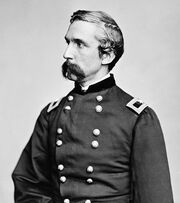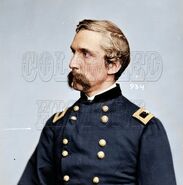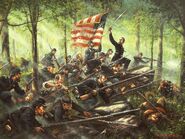
Joshua Lawrence Chamberlain (8 September 1828 – 24 February 1914) was Governor of Maine (R) from 2 January 1867 to 4 January 1871, succeeding Samuel Cony and preceding Sidney Perham. Chamberlain was a famed Union general during the American Civil War, becoming a hero after leading the 20th Maine Volunteer Infantry Regiment at Little Round Top during the decisive Battle of Gettysburg in 1863.
Biography[]
War hero[]

Chamberlain in his army uniform
Joshua Chamberlain was born in Brewer, Maine on 8 September 1828, and he attended Bowdoin College. He became a professor of rhetoric at his alma mater, and he supported the Union at the start of the American Civil War, encouraging his students to do so as well. Chamberlain, who believed that all willing to fight against the Confederate States of America should support the Union, decided to enlist in the US Army, and he became the Lieutenant-Colonel of the 20th Maine Volunteer Infantry Regiment in 1862 under future Mississippi senator Adelbert Ames. In June 1863, after fighting at Fredericksburg and Chancellorsville, he was promoted to Colonel, as Ames was promoted. Chamberlain served as regiment commander with his brother Thomas Chamberlain as his Lieutenant and second-in-command and Sergeant Buster Kilrain as his aide-de-camp, and he dealt with the mutiny of the 2nd Maine Volunteer Infantry Regiment by meeting with its elected leader Joseph Bucklin and persuading the men to continue the fight after giving them a very inspiring speech.
War hero[]

Chamberlain before the Battle of Gettysburg in 1863
Chamberlain became a hero for his bravery at the Battle of Gettysburg in July 1863, holding Little Round Top and Cemetery Ridge, being injured in the foot during his brave stand. Chamberlain's regiment lost two-thirds of its strength during the battle, including Kilrain, and the regiment ran out of ammunition; Chamberlain ordered a bayonet charge that drove the Confederates from Little Round Top. After the successful defense of the hill, Chamberlain and the rest of his regiment were sent to nearby Big Round Top, and they were later transferred to the center of the battlefield. Chamberlain rose to become a brigadier commander of the Army of the Potomac in 1864, fighting in the decisive Union victory at Petersburg, where he was wounded in the hip. Chamberlain famously saluted surrendering Confederate troops at Appomattox Courthouse in 1865, and he was known to be knightly, as the surrendering Confederate commander John B. Gordon put it. During the war, Chamberlain had fought in 20 battles, was cited for bravery four times, lost six horses in battle, and was wounded six times.
Life after the war[]
In 1866, the popular Chamberlain was elected Governor of Maine as a member of the liberal Republican Party, and he refused to enforce the prohibition of alcohol in the state. From 1871 to 1883, he was President of Bowdoin College, and he worked as a lawyer, surveyor, and real estate businessman for years. He died in 1914 in Portland, Maine at the age of 85 from complications from his Petersburg wound.






